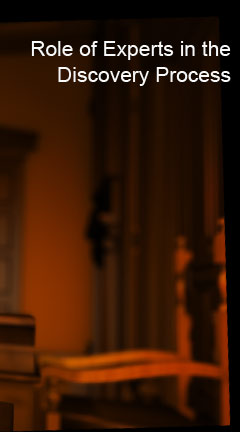Archival Notice
This is an archive page that is no longer being updated. It may contain outdated information and links may no longer function as originally intended.
Home | Glossary | Resources | Help | Course Map
The expert becomes involved in formal discovery in three ways:
- The expert may help generate questions for the opposition in deposition and cross-examination.
- The expert may advise in response to the opposition's questions.
- The expert may be the person responding to written and verbal questions before the trial.
To assist or participate in formal discovery in a meaningful way, the expert must be:
- Professionally and technically competent.
- Conversant with current literature, practice and procedure in his area of expertise.
- Familiar with the evidence in the case.
- Close to reaching a preliminary opinion.
- Well-schooled in the art of brevity.
- Informed about ethical guidelines that attend the discovery process.
Additional Online Courses
- What Every First Responding Officer Should Know About DNA Evidence
- Collecting DNA Evidence at Property Crime Scenes
- DNA – A Prosecutor’s Practice Notebook
- Crime Scene and DNA Basics
- Laboratory Safety Programs
- DNA Amplification
- Population Genetics and Statistics
- Non-STR DNA Markers: SNPs, Y-STRs, LCN and mtDNA
- Firearms Examiner Training
- Forensic DNA Education for Law Enforcement Decisionmakers
- What Every Investigator and Evidence Technician Should Know About DNA Evidence
- Principles of Forensic DNA for Officers of the Court
- Law 101: Legal Guide for the Forensic Expert
- Laboratory Orientation and Testing of Body Fluids and Tissues
- DNA Extraction and Quantitation
- STR Data Analysis and Interpretation
- Communication Skills, Report Writing, and Courtroom Testimony
- Español for Law Enforcement
- Amplified DNA Product Separation for Forensic Analysts


